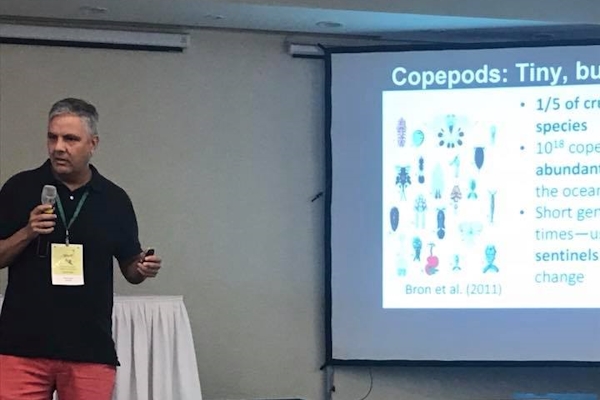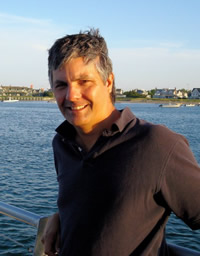Hans Dam (PhD, 1989)

Hans Dam attended SoMAS, known as the Marine Science Research Center (MSRC) at the time, for both his Master’s and Doctoral degrees. After graduating from the University of Washington as an undergraduate in 1982, Hans came to Stony Brook to work with Dr. William Peterson. He received his MS in 1985, but stayed to work on his PhD with Dr. Peterson, finishing in 1989. During his time at the MSRC, Hans studied patterns of copepod abundance and grazing in Long Island Sound.
After leaving SoMAS, Hans spent a year as a post-doc at the University of Maryland’s Horn Point Laboratory. He was hired as an assistant professor at the University of Connecticut in 1991 in both the Department of Marine Sciences and the Department of Ecology and Evolutionary Biology. He has been at UConn ever since, and is currently the Acting Head of the Department of Marine Sciences and the Acting Director of the Marine Science and Technology Center.
 Hans’s research interests include plankton ecology and evolution, the role of zooplankton
in biogeochemical cycling and fluxes of organic matter. Much of his current research
focuses on plankton communities in Long Island Sound, including monitoring zooplankton
populations and examining how they can control harmful algal blooms and how they respond
to projected changes in temperature in the Sound associated with climate change. Hans
also investigates harmful algae such as Alexandrium and how grazers respond to these
blooms. He is in charge of the process studies of LISICOS, the Long Island Sound Integrated
Coastal Observing System (http://lisicos.uconn.edu/). Several faculty at UCONN are conducting studies dealing with the control of hypoxia
in the Sound. The contribution of Hans’ group to LISICOS is the study of downward
fluxes of organic matter and grazing in elemental cycling in the Sound.
Hans’s research interests include plankton ecology and evolution, the role of zooplankton
in biogeochemical cycling and fluxes of organic matter. Much of his current research
focuses on plankton communities in Long Island Sound, including monitoring zooplankton
populations and examining how they can control harmful algal blooms and how they respond
to projected changes in temperature in the Sound associated with climate change. Hans
also investigates harmful algae such as Alexandrium and how grazers respond to these
blooms. He is in charge of the process studies of LISICOS, the Long Island Sound Integrated
Coastal Observing System (http://lisicos.uconn.edu/). Several faculty at UCONN are conducting studies dealing with the control of hypoxia
in the Sound. The contribution of Hans’ group to LISICOS is the study of downward
fluxes of organic matter and grazing in elemental cycling in the Sound.
Hans reflects on his time studying marine sciences at Stony Brook: “At the risk of sounding corny, I am happy to say that my time at MSRC was one of the happiest ones. First, I had great teachers and mentors who helped me become a professional researcher, treated me with respect, and were extraordinarily generous with their time and their encouragement. Second, I also had great mates in my fellow students, some of whom have become life-long friends and colleagues. A great deal of what I am today, I owe to my years at MSRC.”
